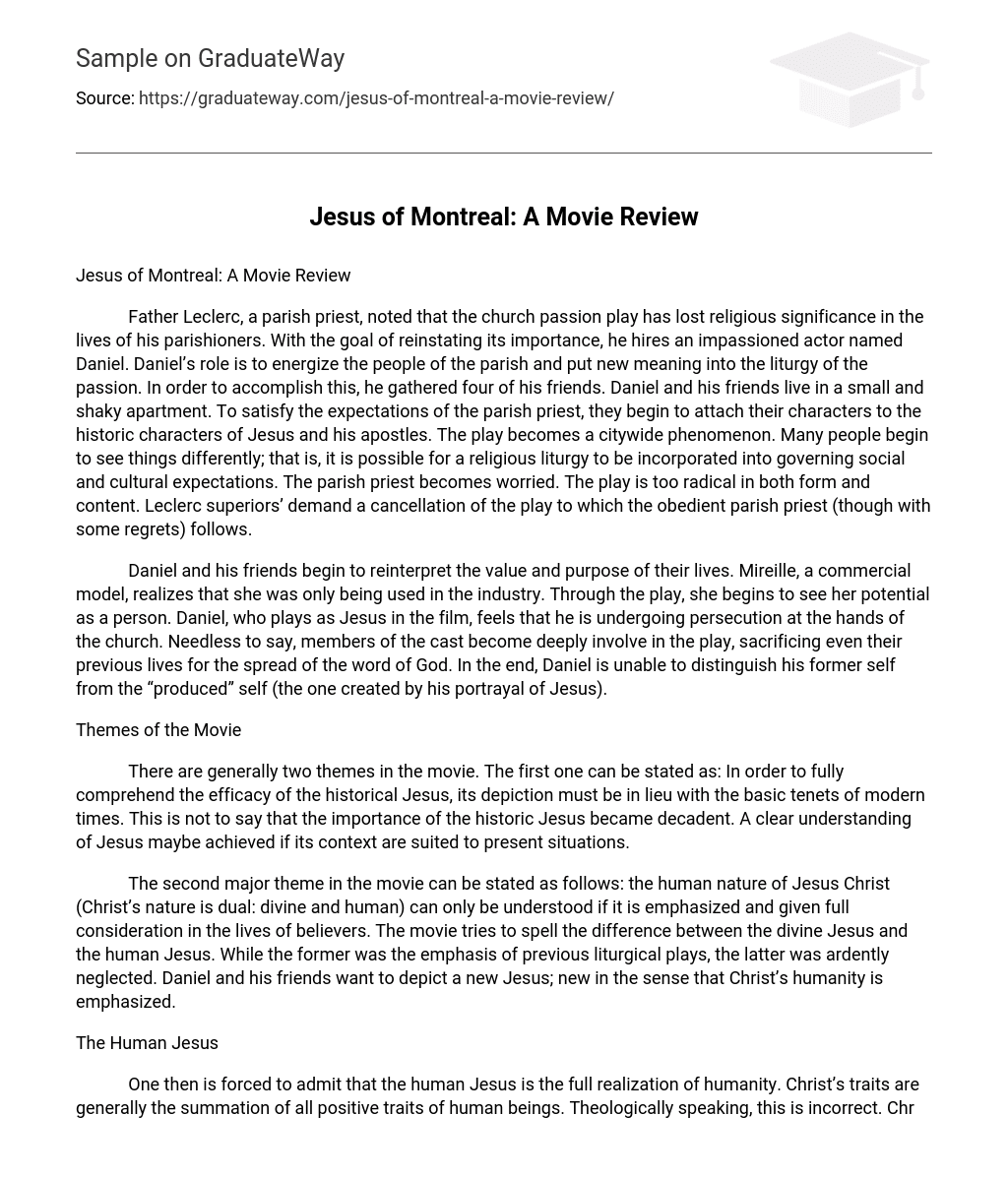Father Leclerc, a parish priest, noted that the church passion play has lost religious significance in the lives of his parishioners. With the goal of reinstating its importance, he hires an impassioned actor named Daniel. Daniel’s role is to energize the people of the parish and put new meaning into the liturgy of the passion. In order to accomplish this, he gathered four of his friends. Daniel and his friends live in a small and shaky apartment. To satisfy the expectations of the parish priest, they begin to attach their characters to the historic characters of Jesus and his apostles. The play becomes a citywide phenomenon. Many people begin to see things differently; that is, it is possible for a religious liturgy to be incorporated into governing social and cultural expectations. The parish priest becomes worried. The play is too radical in both form and content. Leclerc superiors’ demand a cancellation of the play to which the obedient parish priest (though with some regrets) follows.
Daniel and his friends begin to reinterpret the value and purpose of their lives. Mireille, a commercial model, realizes that she was only being used in the industry. Through the play, she begins to see her potential as a person. Daniel, who plays as Jesus in the film, feels that he is undergoing persecution at the hands of the church. Needless to say, members of the cast become deeply involve in the play, sacrificing even their previous lives for the spread of the word of God. In the end, Daniel is unable to distinguish his former self from the “produced” self (the one created by his portrayal of Jesus).
Themes of the Movie
There are generally two themes in the movie. The first one can be stated as: In order to fully comprehend the efficacy of the historical Jesus, its depiction must be in lieu with the basic tenets of modern times. This is not to say that the importance of the historic Jesus became decadent. A clear understanding of Jesus maybe achieved if its context are suited to present situations.
The second major theme in the movie can be stated as follows: the human nature of Jesus Christ (Christ’s nature is dual: divine and human) can only be understood if it is emphasized and given full consideration in the lives of believers. The movie tries to spell the difference between the divine Jesus and the human Jesus. While the former was the emphasis of previous liturgical plays, the latter was ardently neglected. Daniel and his friends want to depict a new Jesus; new in the sense that Christ’s humanity is emphasized.
The Human Jesus
One then is forced to admit that the human Jesus is the full realization of humanity. Christ’s traits are generally the summation of all positive traits of human beings. Theologically speaking, this is incorrect. Christ is absolute and eternal. Christ’s humanity is perfect in itself; a perfection that holds no bound or limit. However, the film does not put Christ in the pedestal of divinity. It appeals to the historical man Jesus in order to give the audience a common touch of humanity. Simply put, the efficacy of Jesus Christ as the divine image of the Father is deemphasized to provide a general background of his humanity. In this way, the film is able to depict the other nature of Jesus Christ, although in very unconventional manner.
Insights
There is real danger in deemphasizing the divinity of Jesus from a theological point of view. The audience would feel that the historic Jesus is nothing but a representation of humanity; that Jesus is more human than divine. In my part, such de-emphasis is critical in a full understanding of Jesus Christ. The man Jesus fulfilled his mission in history, not because of his inherent humanity, but because of God’s will. Hence, the film should take into consideration facts not merely from the point of view of the modernist but also from orthodox history. The benefit is clear: a full picture of Jesus emerges.
Reference
Jesus of Montreal. 1989. Denys Arcand (Director).





